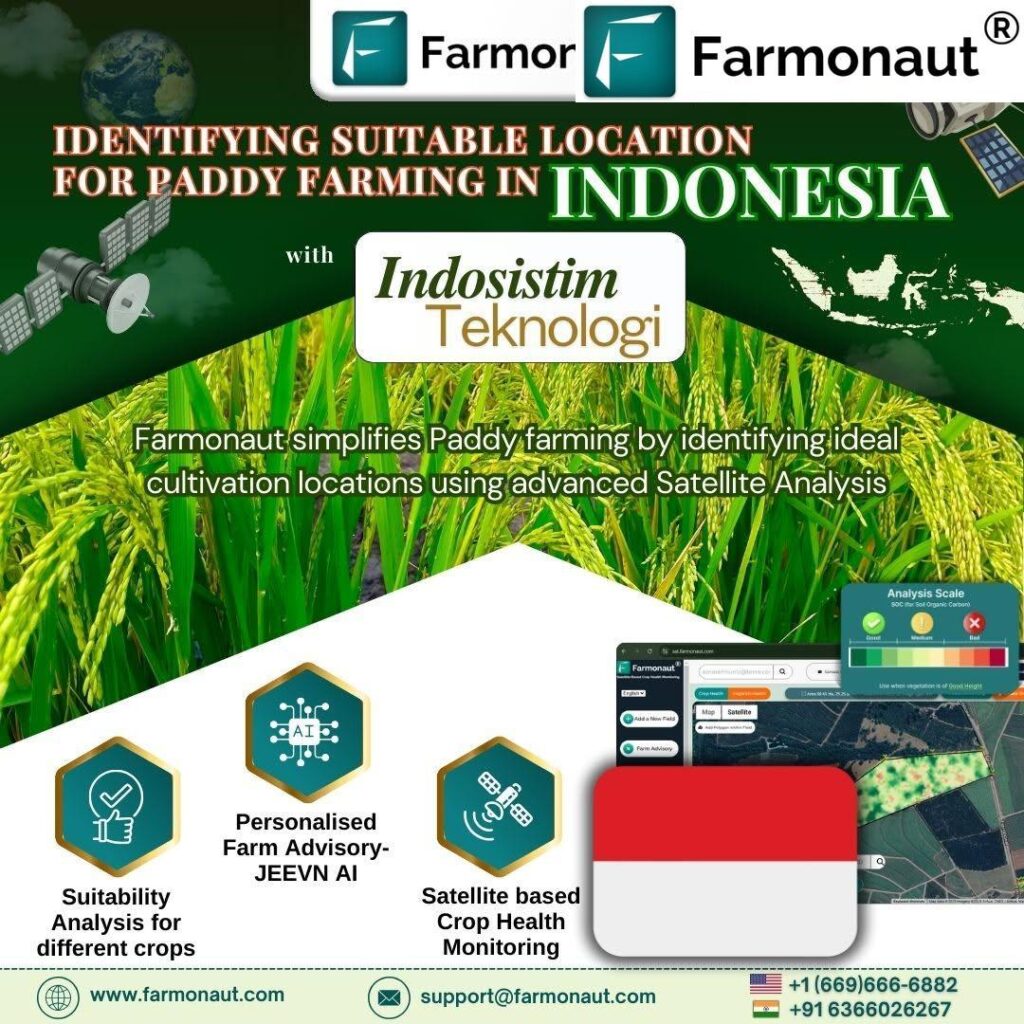US-Japan Trade Talks: Unlocking Agricultural Market Access and Economic Security Cooperation
“US-Japan trade talks aim to address nontariff barriers affecting industrial goods, safety standards, and regulations in under 20 areas.”
In the ever-evolving landscape of international trade, we find ourselves at a crucial juncture as the United States and Japan prepare to embark on a series of high-stakes negotiations. These talks promise to reshape the agricultural market access between the two economic giants while simultaneously addressing broader issues of economic security cooperation. As representatives of Farmonaut, a pioneering agricultural technology company, we recognize the profound implications these discussions may have on the global agricultural sector and the potential for innovative technologies to play a pivotal role in this evolving narrative.
The Backdrop of US-Japan Trade Negotiations
The upcoming trade talks between Washington and Tokyo are set against a backdrop of shifting global trade dynamics and increasing economic interdependence. U.S. Trade Representative Jamieson Greer’s recent testimony before a Senate committee has set the stage for what promises to be a comprehensive and far-reaching negotiation process. At the heart of these discussions lies the ambitious goal of prying open the Japanese agricultural market, a move that could have significant ramifications for farmers and agribusinesses on both sides of the Pacific.

As we delve deeper into the intricacies of these negotiations, it’s crucial to understand that the scope extends far beyond traditional tariff discussions. The talks aim to address a complex web of nontariff barriers, including safety standards for automobiles and regulations affecting industrial goods. This comprehensive approach reflects a growing recognition that true market access in the 21st century requires tackling structural impediments that often prove more challenging than tariff reductions alone.
Agricultural Market Access: A Key Focus
The agricultural sector stands at the forefront of these negotiations, with both nations recognizing its strategic importance. For the United States, expanding access to Japan’s notoriously protected agricultural market represents a significant opportunity for American farmers and exporters. Conversely, Japan must balance the need to protect its domestic agricultural industry with the potential benefits of increased trade and cooperation with its long-standing ally.
In this context, innovative agricultural technologies like those offered by Farmonaut could play a crucial role in bridging the gap between these competing interests. Our satellite-based farm management solutions and AI-driven advisory systems have the potential to enhance productivity and sustainability in agriculture, potentially easing some of the concerns surrounding market liberalization.
Nontariff Barriers: The Hidden Challenges
While tariffs often grab headlines, nontariff barriers represent a more insidious challenge to free trade. These barriers can take many forms, from complex regulatory requirements to opaque safety standards. In the context of US-Japan trade, addressing these barriers is crucial for achieving meaningful market access, particularly in sectors like automobiles and industrial goods.
For instance, harmonizing safety standards for automobiles could significantly reduce costs for manufacturers and ultimately benefit consumers in both countries. Similarly, aligning regulations for industrial goods could open up new opportunities for businesses on both sides of the Pacific, fostering innovation and competition.
Economic Security Cooperation: A New Frontier
Perhaps one of the most intriguing aspects of these negotiations is the focus on economic security cooperation. This reflects a growing recognition that in today’s interconnected world, economic and national security are inextricably linked. The talks aim to explore areas of alignment in export control, investment screening, and energy sector collaboration.
“Vietnam has already committed to lower tariffs on American goods, setting a precedent for US-Asian trade negotiations.”
This emphasis on economic security cooperation opens up exciting possibilities for collaboration in cutting-edge technologies and strategic sectors. For companies like Farmonaut, this could mean new opportunities to contribute to food security initiatives through our advanced crop monitoring and management tools. Our carbon footprinting solutions could also play a role in supporting sustainable practices in the energy sector.

The Broader Context: US Trade Policy and Global Implications
The US-Japan trade talks do not exist in isolation. They are part of a broader trend in US trade policy, which has seen a shift towards bilateral negotiations and a focus on addressing specific trade imbalances. The recent commitment by Vietnam to lower tariffs on American goods serves as a precedent and potential model for these negotiations.
Moreover, the outcome of these talks could have far-reaching implications for global market access and international trade agreements. As two of the world’s largest economies, any agreements reached between the US and Japan could set new standards for trade negotiations worldwide.
The Role of Technology in Facilitating Trade
As these negotiations unfold, it’s important to recognize the critical role that technology can play in facilitating trade and addressing some of the challenges being discussed. At Farmonaut, we believe that our advanced agricultural technologies can contribute to this process in several ways:
- Enhancing Productivity: Our satellite-based crop health monitoring and AI advisory systems can help farmers in both countries optimize their yields, potentially easing concerns about food security and market competition.
- Ensuring Traceability: Our blockchain-based traceability solutions can help address concerns about food safety and quality, facilitating smoother trade in agricultural products.
- Supporting Sustainability: Our carbon footprinting tools can help businesses in both countries meet evolving environmental standards, an increasingly important factor in international trade.
- Facilitating Finance: Our crop loan and insurance solutions can help reduce risk in agricultural trade, potentially opening up new opportunities for farmers and exporters.
Comparative Analysis of US-Japan Agricultural Trade Negotiations
| Negotiation Areas | Current Status | Potential Outcomes |
|---|---|---|
| Agricultural Tariffs | Average tariff rate of 15% on US agricultural exports to Japan | Possible reduction to 5-10% over a 5-year period |
| Non-tariff Barriers | Complex regulatory requirements and safety standards | Harmonization of standards and streamlined approval processes |
| Export Controls | Limited alignment on sensitive technologies | Enhanced cooperation on export control regimes |
| Investment Screening | Varying approaches to foreign investment in critical sectors | Coordinated screening mechanisms for foreign investments |
| Energy Sector Collaboration | Limited cooperation in renewable energy technologies | Joint initiatives in clean energy development and trade |
Challenges and Opportunities
While the potential benefits of these trade talks are significant, it’s important to acknowledge the challenges that lie ahead. Negotiating market access in sensitive sectors like agriculture often involves complex political calculations and the need to balance competing domestic interests. Moreover, aligning regulatory standards and addressing nontariff barriers requires careful navigation of complex bureaucratic systems.
However, these challenges also present opportunities for innovation and collaboration. For instance, the push for greater economic security cooperation could lead to new partnerships in emerging technologies and strategic sectors. At Farmonaut, we see potential for our fleet management and large-scale farm management solutions to play a role in enhancing efficiency and security in agricultural supply chains.
The Path Forward
As these crucial trade talks between the United States and Japan unfold, we at Farmonaut remain committed to supporting the agricultural sector through innovative technology solutions. Our crop plantation and forest advisory services can provide valuable insights to policymakers and farmers alike as they navigate the changing landscape of international agricultural trade.
We believe that by embracing technological innovation and fostering cooperation, both nations can achieve their goals of enhanced market access and economic security. As the negotiations progress, we will continue to monitor developments closely and stand ready to contribute our expertise to this important dialogue.
Conclusion
The US-Japan trade talks represent a pivotal moment in international trade relations, with far-reaching implications for agricultural market access and economic security cooperation. As these negotiations unfold, they will likely shape the future of not only bilateral trade between these two economic powerhouses but also set precedents for global trade agreements.
At Farmonaut, we remain committed to supporting the agricultural sector through these changes, offering innovative solutions that can enhance productivity, sustainability, and transparency in farming practices. We believe that by leveraging advanced technologies and fostering international cooperation, we can help create a more resilient and prosperous global agricultural ecosystem.
FAQ Section
- What are the main goals of the US-Japan trade talks?
The main goals include expanding agricultural market access, addressing nontariff barriers, and enhancing economic security cooperation. - How might these negotiations affect farmers?
Farmers could see new export opportunities and potentially face increased competition, but may also benefit from technological advancements in agriculture. - What role does technology play in these trade negotiations?
Technology, particularly in agriculture and security sectors, can facilitate trade by enhancing productivity, ensuring traceability, and supporting sustainability efforts. - How might the outcome of these talks impact global trade?
The agreements reached could set new standards for international trade negotiations and influence market access worldwide. - What are nontariff barriers, and why are they important in these talks?
Nontariff barriers include regulations, standards, and other non-price restrictions on trade. They are crucial because they often pose more significant obstacles to market access than tariffs.
Earn With Farmonaut: Affiliate Program
Earn 20% recurring commission with Farmonaut’s affiliate program by sharing your promo code and helping farmers save 10%. Onboard 10 Elite farmers monthly to earn a minimum of $148,000 annually—start now and grow your income!
Access Farmonaut’s Innovative Solutions
Experience the future of agriculture with Farmonaut’s cutting-edge technologies:
For developers interested in integrating our powerful satellite and weather data into their applications, explore our API and API Developer Docs.
















